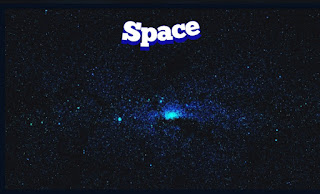Why is space black?
Hey friends, ever wondered in the night sky when there is a big lit moon and twinkling stars still the sky is black? Let's answer this deep and dark question then," WHY IS SPACE BLACK?"
Is the universe dark?
It turns out that roughly 68% of the universe is dark energy dark matter makes up about 27% of the rest of everything on earth everything ever observed with all of our instruments all normal matter adds up to less than 5% of the universe
Our sun is a star that single-handedly illuminates our days with bright light and vibrant colors
as we all know there are countless such twinkling stars in the universe. That means that our space should be flashing with brightness. Isn't it friends?
But for some strange reason, the space is still dark. Now this of course makes us wants to know that why the space is black? But to know that first, we should know that why the earth has so much light.
The answer for that actually lies in the Earth's atmosphere layer.
Yes, this layer is made up of molecules of gases, water droplets dust, and dirt. So when the light comes from the Sun tit scatters in different colors that travel in a different direction, allowing us to see the blue sky and the gorgeous shades of sunrise and sunset.
All those space has some gas and cosmic dust, but there is no atmosphere with molecules to reflect the traveling light. Hence space appears dark due to it. Now you must be wondering that what will happen if the earth loses its atmosphere? If the earth loses its atmosphere then the earth will constantly be in darkness too.
(come back to my blog if you want to know about what will happen to the Earth if it will lose its atmosphere I will be writing it soon)
But, I know what you're thinking if light keeps traveling constantly then why doesn't the light enter our atmosphere and lighten the earth even at night. Well, that's because the scientists believe that since The Big Bang(stay tuned if you also want to know about the big band theory) occurred 13.8 million years ago everything has been moving away from the point of the cosmic egg from where it all began.
In other words, our universe is still expanding and things are getting further away from each other. This also includes light particles that are moving away and spreading out fleeting for the dark spots in the space. Not only that, this expansion causes the wavelength of the light to expand so much that it fades away before reaching our eyes.
Just like the light coming from a torch can't go beyond a certain distance. Another reason why the space is black is that light can travel at a specific speed. As most stars are located far from our planet( the nearest star to earth is the Sun and the second is Proxima Centauri) the light coming from them is yet to reach us or it may die even before reaching our planet.
But then what about the stars that are close to the earth for example the sun and Proxima Centauri. Well, you won't believe it but our second nearest star Proxima Centauri is four light-years from us which is about 25 trillion miles away (a lot of distance).
Comparatively, Sun is only 93 million miles away from us (not that it is a very short distance it is a pretty long distance but at least less than Proxima Centauri's distance from us). Plus Proxima is seven times smaller than our Sun and gives a fraction of the Sun's light. So, as there is no other bright object near our planet, space seems to be a dark place to us.
Here's the thing my friends' space only appears dark because our eyes cannot detect any other form of light. But scientists have invented advanced technologies which are enough to allow them to see other colors which are hidden from our naked eyes. This has given them the chance to determine what gases make up some of the nebulas. Hopefully, there will be glasses that will also once allow us to see these colors too.
(To see more blogs about space click👉Meteors)





0 Comments